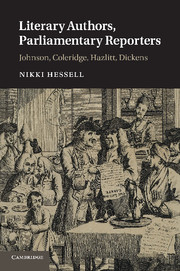Book contents
- Frontmatter
- Contents
- Acknowledgments
- Preface
- Chapter 1 Introduction: reporting and the individual talent
- Chapter 2 Samuel Johnson: beyond Lilliput
- Chapter 3 Samuel Taylor Coleridge and the freedom of the gallery
- Chapter 4 William Hazlitt and the real eloquence of the British Senate
- Chapter 5 Charles Dickens and the ghost of speeches past
- Chapter 6 Conclusion: taking parliamentary reporting seriously
- Bibliography
- Index
Chapter 3 - Samuel Taylor Coleridge and the freedom of the gallery
Published online by Cambridge University Press: 05 November 2011
- Frontmatter
- Contents
- Acknowledgments
- Preface
- Chapter 1 Introduction: reporting and the individual talent
- Chapter 2 Samuel Johnson: beyond Lilliput
- Chapter 3 Samuel Taylor Coleridge and the freedom of the gallery
- Chapter 4 William Hazlitt and the real eloquence of the British Senate
- Chapter 5 Charles Dickens and the ghost of speeches past
- Chapter 6 Conclusion: taking parliamentary reporting seriously
- Bibliography
- Index
Summary
At various moments throughout his career, Samuel Taylor Coleridge demonstrated an insider’s knowledge of the way Parliament was reported. In an 1816 letter, he noted that “it seems epidemic among Parliament men in general to affect to look down upon & despise Newspapers, to which they owe 999/1000 of their influence & character, and at least 3/5ths of their knowledge & phraseology.” In an article for the Courier the following year, he dismissed the reputed eloquence of the MP William Smith, saying it was “entirely owing to the Procrustes Tyranny of the Parliamentary Reporters, who had persisted in measuring his harangues by their own pocket-ruler instead of the patience of the House.” These were the remarks of someone who knew how parliamentary reports were generated in the early decades of the nineteenth century.
Coleridge had gained these insights in 1800, when he worked for the Morning Post, a paper that aligned itself with the opposition to William Pitt’s government. The paper’s editor, Daniel Stuart, had found it difficult to hold Coleridge to his obligations since hiring him in 1799. He decided to take his recalcitrant employee to the gallery of the House of Commons, “in hopes he would assist me in parliamentary reporting, and that a near view of men and things would bring up new topics in his mind.” Coleridge thus became part of the parliamentary press corps in late January 1800, but he had already given some thought to the way Parliament should be covered; in his paper The Watchman, he had argued that “the legal disadvantages which attend the task of reporting the speeches” partly contributed to the “fatiguing and colourless confusion” of contemporary parliamentary oratory. The implication was not only that the reporters deserved more consideration from Parliament, but also that what citizens understood to be parliamentary oratory was inevitably mediated by the press.
- Type
- Chapter
- Information
- Literary Authors, Parliamentary ReportersJohnson, Coleridge, Hazlitt, Dickens, pp. 61 - 96Publisher: Cambridge University PressPrint publication year: 2011

